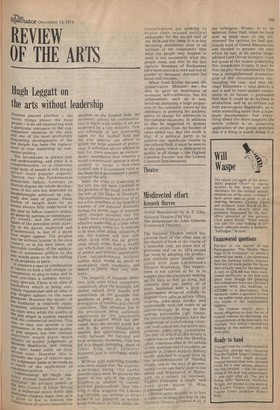REVIEW OF THE ARTS
Hugh Leggatt on the arts without leadership
Pessima placent pluribus — the worst things please the most People — is an old classical tag with a particular relevance to the contemporary situation in the arts, and one of the most profoundly disquieting developments of the last decade has been the replacement of true leadership by consensus politics.
The second-rate is always safe
i
and undemanding, and since t s Comprehensible to a relatively large body of people it will always attract more popular support. 'herein lies the fundamental democratic fallacy. Contrary to Marxist dogma the whole development of the arts has depended on breakthroughs achieved by relatively few men of genius. These flashes of insight were by no Means always fully understood at the time by fellow creative artists, at alone by patrons or contemporrarY society, and the archetypal Ogure of the penniless artist stary.Ing in his garret, neglected and Ill-understood, is less of a myth than
might appear. The prophet
may be without honour in his own Fountry, or in his own :times; an inevitable corollary of the application of consensus politics to the %rts would seem to be the stifling e't all prophets at birth.
It requires a special combination
of talents to kick a ball straight or ,eonsistently to sing in tune, and in tooth activities a ruthless meritocracy prevails. There is an elite of iootballers which is being constantly regenerated and an elite of POP singers subject to the same 1,1ressures. However the quality of "le footballer is relatively easily nth.easured, ultimately by whether t;Is team wins, while the quality of ,a Pop singer is crudely equated With his commercial success. This tilaY or may not provide a fair oascsessment of the relative quality 17313 singers, but few realistic
.°0Servers would place much 1-„ellance on quality judgement as oetween Beethoven and certain
13(re21:i stars based solely .their :ord sales. However this is rii`c.lselY the type of relative quaJtidgement-liable to be made as
• result of the application of • sensus politics.
?fortunatelY Mr Hugh Jen' us s avowed intentions to `de h
rno . the advisory panels of tarecratise tarecratise are Arts Council of Great Britain Pa rtia deliberate move down this ular slippery slope. Just as it given to few to possess the "Ination of talents required for
stardom on the football field, the necessary talents for communication in depth with works of art are possessed by a tiny minority. Few are ashamed of not possessing talent for the football field and the wise selector can afford to ignore the large amount of gratuitous, ill-informed advice offered to him, but there remains an extraordinary, assumption that whereas a broad consensusxif opinion is most unlikely to create a first-class football side it is somehow valid as the basis for a government's policy towards the atts.
Sadly the crisis of leadership in the arts has not been confined to the prowess of Mr Hugh Jenkins in the role of the Duke of PlazatoroThe pusillanimous behaviour of all but a few members of the boards of trustees of our national museums during the recent saga of museum entry charges revealed only too clearly their-total failure to provide effective leadership at a time when it was plainly called for. It remains to be seen what Public initiative, if any, the trustees will now take when faced with the far graver crisis which arises from a wealth tax which does not exclude works of artistic and historic importance. Firm outspokenness without further delay would do much to re-establish their credibility and indeed to justify their very existence.
The majority of museum directors, with some brave exceptions, consciously shun the limelight and shelter behind their boards and committees on the grounds that questions of policy are the sole prerogative of trustees and elected councillors. This situation has in the provinces been seriously aggravated by the lamentable staffing situation which has prevailed since the second
world war and by the serious imbalance in salaries and opportunities which exists between the national and local authority museums. This has led to a deeply damaging drain of talent from local authority museums and to inevitable debilitation.
Without fully endorsing Goethe, who once stated that the majority is invariably wrong, very careful consideration must be given to the future of the arts in the United Kingdom in relation to current political philosophies. The leftwing is now wagging the Labour dog furiously (an attempt to treat works of 'art primarily as wealth being indicative of this), while the Conservatives are seeking to evolve their revised political philosophy for the second half of the 1970s and the 19805. It is at last becoming abundantly clear to all sections of the community that what the people may happen to want is not necessarily what the people need, and that in the last arialysis Members of Parliament have been elected to lead and not to pander to incessant demands for bread and circuses.
When Lord Eccles became the Conservative Minister for the Arts he gave an impression of messianic self-confidence, but his achievement, such as it was, involved alienating a large proportion of the culturally aware by his obstinacy in pressing his pathetic policy to charge for admission to the national museums. In addition to this he neglected to protect creative artists from the burden of value-added tax. But the truth is that, if a political party is to achieve any significant results in the cultural field, it must be seen to be the party which is dedicated to quality in all things — the Highest Common Factors not the Lowest Common Denominators.




















 Previous page
Previous page